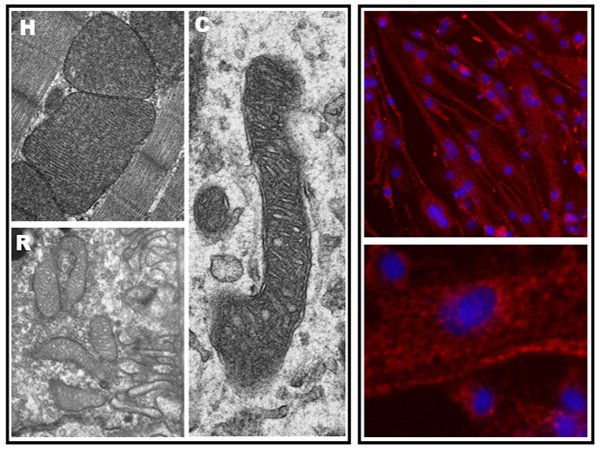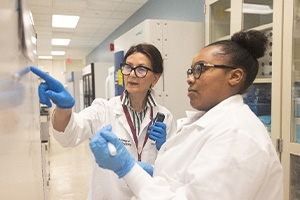Rosca Research
Mariana Rosca, M.D.'s lab studies mitochondria in organs and cultured cells, and develops novel approaches to alleviate organ damage induced by defects in mitochondrial bioenergetics.
 H:
Electron microscopy of heart tissue showing interfibrillar mitochondria
with double membranes and multiple folding of the inner membrane called
cristae. R: Electron microscopy of the retinal pigment epithelium
showing multiple mitochondria. C: Electron microscopy of the Purkinje
layer of the cerebellum showing one large mitochondrion in the center
and one small round mitochondrion on the left. On the right there are
fluorescence microscopy images with a lower (up) and higher
magnification of cultured cardiomyocytes stained with
4',6-diamidino-2-phenylindole (DAPI) for nuclei (blue) and Mito Tracker
red for mitochondria (red).
H:
Electron microscopy of heart tissue showing interfibrillar mitochondria
with double membranes and multiple folding of the inner membrane called
cristae. R: Electron microscopy of the retinal pigment epithelium
showing multiple mitochondria. C: Electron microscopy of the Purkinje
layer of the cerebellum showing one large mitochondrion in the center
and one small round mitochondrion on the left. On the right there are
fluorescence microscopy images with a lower (up) and higher
magnification of cultured cardiomyocytes stained with
4',6-diamidino-2-phenylindole (DAPI) for nuclei (blue) and Mito Tracker
red for mitochondria (red).
Current research
 The lab is currently focused on
Mitochondrial redox imbalance in the heart upon metabolic challenges and
electron transport chain defects, d has received an NIH R15 grant
HL157838 for this.
The lab is currently focused on
Mitochondrial redox imbalance in the heart upon metabolic challenges and
electron transport chain defects, d has received an NIH R15 grant
HL157838 for this.
Funding
The research is currently funded by an R15 award from the National Institutes of Health for the project entitled "Nicotinamide Nucleotide Transhydrogenase (NNT) and bioenergetic metabolism in complex I defective cardiac mitochondria". To fulfill the specific aims for this project we use mice systemically and cardiac-specific deficient in NNT and investigate the role of NNT in supporting oxidative metabolism and cardiac function while maintaining the mitochondrial and cardiac redox balance. We use isolated cardiac mitochondria and tissue homogenate to perform respiratory and biochemical studies, protein and mRNA quantitation and various molecular biology techniques. The involvement of NNT is driving the differences in the severity of mitochondrial cytopathies in males and females is a major focus of our research.
Potential additional projects
- Involvement of mitochondrial abnormalities in the retinal photoreceptor damage.
- MicroRNAs as regulators of mitochondrial and cardiac health.
Rosca lab staff and volunteers
Rosca’s lab is supported by two first-year medical students who volunteer their time.
Rosca lab location
Rosca's lab is housed in the Research Laboratory building at 2630 Denison Drive, south of the main campus.